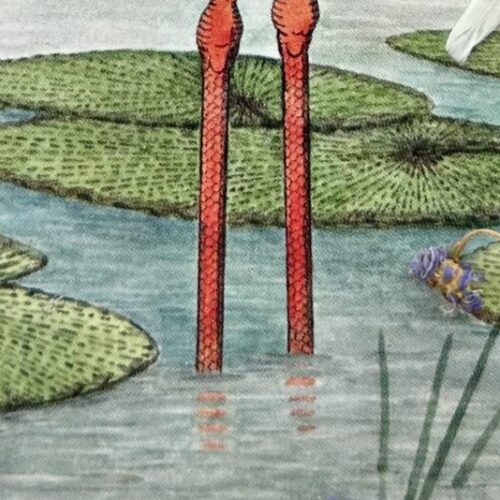The mothers hugged their boys close in the summer, afraid to let them wander in the sun of a world still alien to them. The fathers, out of habit, drew lines around the building, confining them to their narrow apartments. They closed windows and made it so the boys felt no brush of a summer breeze, the choking ACs drowning out any lazy thought they might entertain.
With the shades closed, the boys examined themselves in the fluorescent lights. In their morning reflections, their brownness would be sharp, identifiable on a scale. They’d wander about through the day, trying to find a strip of a different shade under another light. They’d be restless, standing and sitting. Their eyes would try to peek through the shades, wanting a sliver of sun to enrich their color.
They shared pictures of their color with each other. Some of their color was obscured by the growing fuzz of hair. Others saw their skin lighten as it came closer to their shoulders, year-round sleeves hiding a lighter complexion, one which they sometimes wished spread across the rest of their body so they could be more invisible.
Restless, fidgeting, eyes glazed over. The mothers forced them out into the dog days with nowhere to go. The mothers, who’d only ever learned the four-block radius around their homes, told the boys to go further, find somewhere else to be agitated, vicariously exploring their new world through the boys.
Some of the boys had water on their minds, fleeting memories of having passed by the ocean once, impressions of small blue waves. “Coney Island,” one boy said. “Avenue?” another asked, and he said no, Coney Island, the rides, the boardwalk, the beach. It’d only ever manifested as a place at the end of their subway line, one of the orange places past their stop that they always wondered about, their fathers too fatigued and mothers too modest to take them.
With the few dollars they had, the boys boarded the B68, the Q, the N, maybe the F. The more curious of them walked the whole way to see what world stretched between them and the ocean, finding odd nooks and alleys to tuck away like small treasures. Their mothers had told them not to wear away their school shoes wandering, so they wore slippers from 99¢ stores. Arched feet pressed on flat foam that sank as the day wore on, the strain radiating through their shins, making them sit on empty stoops along the way, shaking off the stiffness before they moved again.
Then they arrived, felt the blast of the sun in an open sky, the boardwalk, a furnace that burned their fragile feet in cheap slippers. Heads on a swivel, they tried to regain their sense of direction, a place to go through the throngs of people pushing past. They pushed through the vendors selling bright toys, women with blotched, cherry faces, men with shirts on their shoulders, sweaty skin reflecting the sun along their angular muscles.
A flicker through bodies, yellow and blue. The boys had imagined the beach would be a long, virgin strip of gold topped by a foam of azure. But here the sand was pale, vivacity sapped, the ocean shifting its color under the shifting sky, serenity interrupted by the summer crowds.
Heat walking up their legs, the boys slipped off their slippers, running over the sand on their toes until they reached the rocks. They climbed, pretending to be on mountains they’d only seen on television. One or two watched the others inch closer to the water, threatening to dip in a toe or two. The others rubbed cool water on their burning brown shoulders, trying to learn something from each other about how to be in water. Tentatively, they dipped their feet in as well, the first rush cold, then soothing.
They stayed there, dipping their feet in and out, playing tag with the heat, and saw new shades of themselves like rings in a tree, like time accumulated, like they’d lived so many lives already. They hitched their sleeves and saw the lighter tone of their shoulders, the dichotomy fascinating and troubling, asking themselves if the surface changed something below and if they’d been born anew.
*
After that, the boys went back to Coney Island again and again. One day, they pooled together money to ride the Cyclone, rails crunching on wooden slats, teeth pressed down in concert. At the peak, they turned their faces up, sun full on them, faces blurring to the same hue in the blinding light. Another day, they bought the largest cotton candy they could, pawing pieces off, the sugar rushing and pulling their teeth back as if smiling.
Darker and darker, day by day, they felt something inside them solidify. They began to hitch their sleeves at the beach so the color could go along their arms. When they saw themselves under their fluorescent lights again, the color didn’t seem as alien as before.
Their fathers, angry at first, saw the boys morph in front of them, came home from work to find someone else staring into the fridge, someone else blocking the bathroom door. They shook, expecting the boys to turn their eyes down in humility, but seeing instead the hooded circles under their eyes, something in them broke, not for their children, but for their own sense of manhood, fatherhood gone now.
Then the summer ended, and under different lights in classrooms, their colors shifted again, lightening as the year wore on. They took pictures, documenting, watching, and comparing with their summer skin. Those with the nascent fuzz held onto their color a little longer, but even they fell back to watching their summer photos with a vague ache for summer again.
One day, the boys heard a storm was coming close to where they lived, passing over the ocean to Coney Island. They heard the storm outside, buffeting trees and power lines, and wondered about the beach, if the sand had been consumed, if the water was gray or still blue, if it rolled like meadows or was patterned like small cliffs. When the power went out, they lit candles, watching their color again in the dim flame.
Out of curiosity, they went to Coney Island once the water pulled back, ignoring the mother’s plaintive faces and the fathers who looked the other way now. They thought it’d be gray, the sand, under a gray October sky, but there was more: out-of-place trinkets where seashells were before, a broken umbrella, a broken shoe, a broken chair, broken everything. Brokenness everywhere and in them, too.
They walked down the empty boardwalk. Over the horizon, where in the summer they could separate the sky from the water, they saw only rusted tankers drifting as if stuck in place. Above them, clouds in shades of darker gray swirled around each other, and under them, seagulls flew unevenly, falling to the sand, their sharp squawks carrying and fading over the sound of waves.
They wouldn’t go back the next summer after high school ended, enamored now by the newer trains with the orange letters, reading the alien names of the stops that came closer to and in Manhattan, unknown names they knew would open new worlds for them now. Dog days went by, getting lost on streets shaded by skyscrapers taller than their apartment buildings. People walked and dressed differently, and they found themselves pulling their shoulders back and quickening their feet, pausing in reflections to see if they were doing it right.
Then they found Washington Square with its long arch, which they walked under joking that it was a passage into a new part of their lives, but they felt the same on the other side.
At first, they hung on the outskirts, unsure how to act when strange but polite men asked if they’d like to buy weed. By the bathrooms, they tried not to stare at the people who went in and didn’t leave. They’d spend some time by the dog park, imagining days where they’d leave Brooklyn behind and maybe live in the taller Manhattan buildings where they could have dogs and take them to parks just like these.
Then, they ventured further in, lounging around the edges of the fountain. There they sat, face up and eyes closed, no thought about how their color would burn darker, just content to feel the peace the warmth brought them. Their reverie broke when they heard laughter and saw girls who also hung around the fountain. They turned to see them, looked away, and then back again. They’d been learning, so they learned some more, how to go in groups and alone, how to be invited, how to appear unaffected, to be patient, when to walk away, and when to stay.
Most of the girls came from all over the city, but some were from NYU. They lived close by and knew where to go and sometimes took them to MacDougal, and further in the West Village to one-room basement clubs where in dim lights they danced to music that pulsed their ears, the confined space pushing them all together, bodies brushing but hands aloof, unsure still, affected bravado rendered thin in the purple light.
Those were the girls who ignored them at first, but perked up when they heard they were born in Brooklyn, who asked them without asking to do a song and dance about their urbanness. So, they hitched their pants and exaggerated their vowels, the sound of their own voice now alien.
The NYU girls kept inviting them, but they stopped going; the novelty had worn off. They instead stayed by the fountain, aware again of how their color had darkened. A pebble fell, a rippling reflection undoing the color, their reflections fading. In the dissolution, a reminiscence of bluer water and grains of sand burrowing between toes. Back in Coney Island, they were invisible. Their color melted in with the crowd as they jostled and were jostled on the boardwalk. There, they could stop and stare at the sun, faces upturned. They could watch the sun the entire length of its descent. They’d watch it fall and fall until its reflection bloomed, spreading outward like an invitation.

Munawar Abbas
Munawar Abbas studied at Hunter College and Stony Brook Southampton. His work has previously appeared in Scoundrel Time and Epiphany. He currently lives in Brooklyn.



